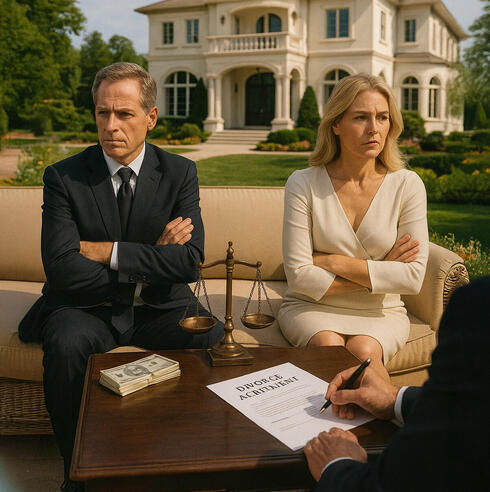
Financial tycoon tried to outwit wife but must pay her $37 million
Tel Aviv court rejects hidden trusts and secret companies in landmark ruling.
A Tel Aviv family court ruled on Wednesday that a wealthy businessman in the financial and capital markets sector, with an estimated fortune of at least $75 million, must pay his ex-wife, the mother of his children, about $37 million. It was also determined that the wife will receive half of the luxury mansion they lived in, valued at no less than $25 million.
The lawsuit focused on dividing their property after the marriage ended. Beyond the ownership of the luxury residence, the main dispute centered on the scope of joint assets subject to division. According to the wife, her husband used his expertise in complex trust structures to hide joint assets from her. The husband, for his part, claimed that all their joint assets were actually in the wife’s possession and denied hiding any wealth.
Judge Yehoram Shaked ruled: “The case before me is one of the most outrageous I have encountered in all my years on the bench. This is a very wealthy family whose fortune, estimated by the wife at around $100 million, is controlled by the husband, who refuses to share any part of it with her.” The verdict was released without revealing the identities of the former spouses.
The couple married more than 25 years ago. The wife claimed that her husband’s exceptional business success and the complete trust she placed in him led to a clear division of roles: she focused on raising their children and managing the home so that he could devote himself to expanding his businesses. Before the conflict erupted, the family enjoyed a lavish lifestyle typical of Israel’s financial elite - luxury residences, high-end vehicles, a staff of housekeepers and nannies, and vacations in exclusive destinations, all funded by the husband’s thriving businesses.
Their main residence in central Israel, with a built area of over 1,500 square meters, includes an elevator, underfloor heating, three kitchens, a gym, a spa with wet and dry saunas, a swimming pool, a tennis court, and more. The property is registered under a foreign company. The wife argued that the house rightfully belonged to both spouses and was built on land they purchased together, but registered under the foreign company at her husband’s discretion.
She testified that their standard of living was extremely high: multiple homes, household staff, luxury cars, and extravagant vacations. She said her husband showered her with lavish gifts, including Rolex watches and luxury cars. She added that they had a joint bank account where her husband deposited about 70,000 shekels every month (approximately $21,000) for her credit card expenses, while the family’s total monthly spending reached about 200,000 shekels ($60,000). She said her husband handled all the finances alone, leaving her unaware of the true extent of their fortune. She described her situation as living in a “golden cage” - completely financially dependent on him.
The husband countered that her lawsuit was filed in bad faith and claimed that after she left the home, he was forced to borrow money from friends to cover his living expenses.
Judge Shaked rejected the husband’s claims and ruled in favor of the wife. He awarded her half of the mansion, despite its registration under a foreign company, and about $37 million. He also ordered the husband to pay her legal fees of 2.5 million shekels and an additional 100,000 shekels for expenses.
The judge wrote: “I was convinced that the husband set himself one overriding goal: not to give his wife a single shekel of the immense wealth they amassed together. Throughout the proceedings, he repeated like a worn-out mantra that the family’s wealth was in her hands. I have no doubt whatsoever that he knew no court would believe this claim, yet he persisted, acting in clear bad faith.”
The judge continued: “His expertise is in moving money into tax shelters and trusts of various kinds, so that when the time comes for exposure, he can feign ignorance and claim the money isn’t his. He devised a long-term plan to hide the family fortune, first from the authorities, and later from his wife and the court. The level of trust I place in him is zero, absolute zero.” He added that the husband is “one of the most brilliant people I have ever met.”
Judge Shaked accepted the wife’s full version, ruling that the family’s assets, excluding the mansion (which she valued at about $25 million), total about $75 million.
Related articles:
He concluded: “For years, the husband acted deliberately to prevent any fair or just division of their fortune, but ultimately failed. I sincerely hope that after reading this ruling, the husband will understand that swift and honest implementation is in everyone’s best interest - his, his children’s, and, of course, his former wife’s.”
The wife’s attorneys said: “We welcome the courageous and important ruling by Vice President Justice Yehoram Shaked, who acted as a gatekeeper and fearlessly protected the weaker side, rejecting the stronger party’s attempts to conceal vast assets. Now, anyone going through divorce while financially vulnerable will know: there is recourse, there is law, and there is a judge.”
The husband’s representatives said: “We believe the verdict contains serious factual and legal errors and largely ignores central, complex issues raised during the proceedings. The defendant intends to appeal.”
